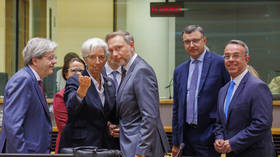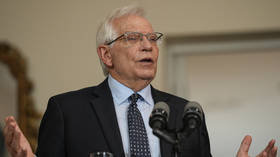Senior EU official weighs in on seizure of Russian assets

The confiscation of Russian foreign assets would be “a very difficult step” as it is not a political decision and requires judicial justification, European Commissioner for Economy Paolo Gentiloni said on Monday.
Earlier this month, several senior EU officials proposed seizing Russian foreign exchange reserves, which had been frozen in response to Moscow’s military offensive in Ukraine. EU foreign policy chief Josep Borrell suggested the funds should be used to cover the cost of rebuilding Ukraine once the conflict is over.
Speaking at the Foreign Press Association in Rome, Gentiloni confirmed that several countries are evaluating the idea of confiscation with support from the European Commission. However, he stressed that “from a legal point of view, the transition from freezing to confiscation is a very difficult step” and thus “the outcome is not certain.”
“We have to respect the law as the rule of law is a founding principle of the EU and we will do it in all cases,” he said.
The commissioner also made it clear that confiscation “is not a political decision,” and has to comply with legal requirements.
Italy has frozen assets worth about €1.8 billion ($1.9 billion), Gentiloni revealed.
Russian Deputy Foreign Minister Alexander Grushko had earlier said that seizing the foreign-exchange reserves of the Russian state would be an act of “complete lawlessness” and would undermine the very basis of international relations. His statement followed remarks by Russian Foreign Minister Sergey Lavrov, who said the freezing of assets, in his opinion, would essentially constitute theft.
Since the beginning of the military operation in Ukraine in late February, half of Russia’s international reserves – around $300 billion – have been frozen as part of sanctions imposed by the US, EU, and their allies. The head of Russia’s central bank, Elvira Nabiullina, said Russian assets have been frozen but not arrested or expropriated. She added, however, that Moscow considers the freezing of its reserves to be unprecedented and will challenge these decisions.
Thousands of Russian individuals have also been sanctioned, with their property and money seized or frozen by governments throughout Europe.
Russia attacked its neighboring state in late February, following Ukraine’s failure to implement the terms of the Minsk agreements, first signed in 2014, and Moscow’s eventual recognition of the Donbass republics of Donetsk and Lugansk. The German- and French-brokered protocol was designed to give the breakaway regions special status within the Ukrainian state.
The Kremlin has since demanded that Ukraine officially declare itself a neutral country that will never join the US-led NATO military bloc. Kiev insists the Russian offensive was completely unprovoked and has denied claims it was planning to retake the two republics by force.













